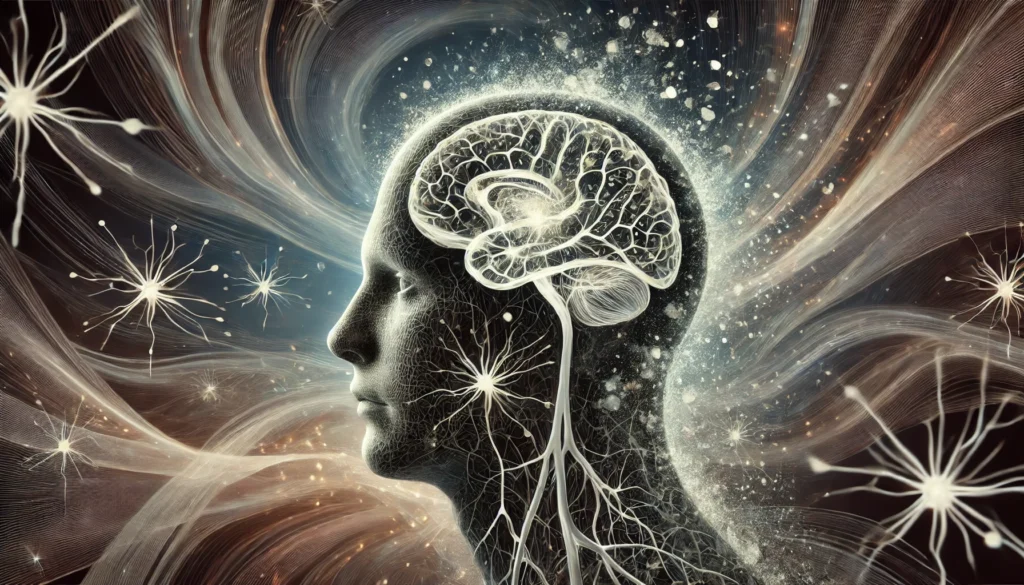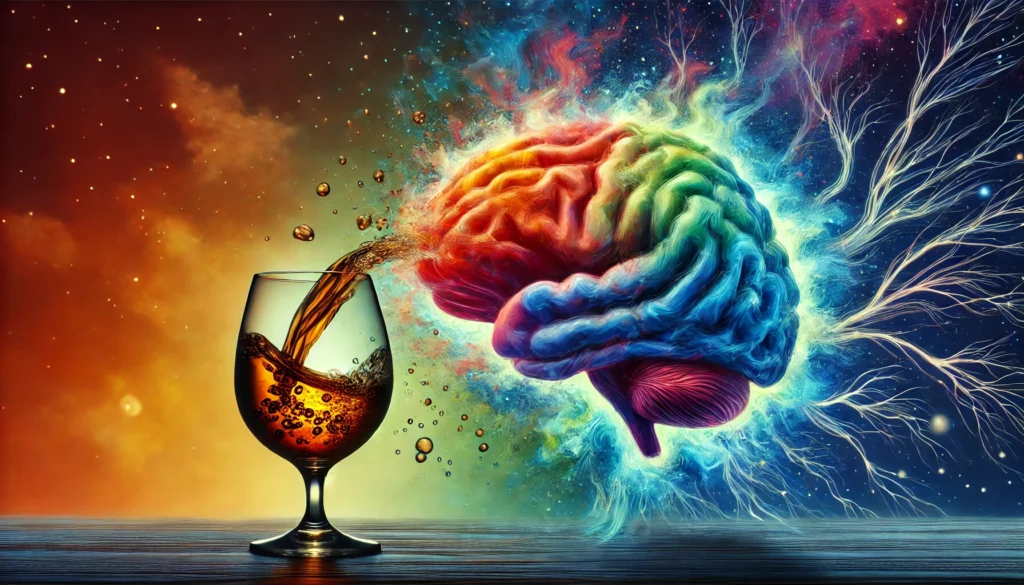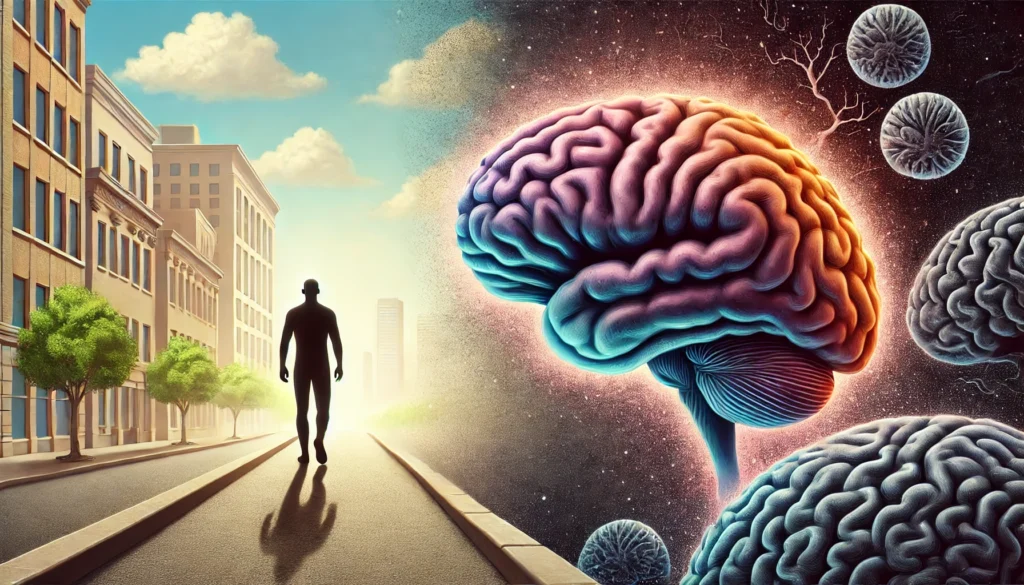When alcohol enters the bloodstream, it quickly impacts the central nervous system, altering neurotransmitter function. This leads to the familiar sensations of relaxation and reduced inhibitions. However, the seemingly benign effects mask the potential for significant brain alterations with prolonged exposure.
You may also like: Understanding the Science Behind Lost Memory
Neurotransmitter Disruption
Alcohol primarily affects neurotransmitters such as gamma-aminobutyric acid (GABA) and glutamate. By enhancing GABA activity and inhibiting glutamate, alcohol creates a sedative effect on the brain. This disruption can lead to impaired judgment, coordination, and memory, especially with increased consumption.
Beyond the immediate effects on neurotransmitters, the long-term disruption can lead to changes in brain chemistry that are difficult to reverse. Chronic exposure to alcohol can lead to adaptations in neurotransmitter systems, causing the brain to become reliant on alcohol for maintaining balance. This dependency can exacerbate withdrawal symptoms and make it challenging for individuals to quit drinking.
The interference with neurotransmitter systems also affects mood regulation. Alcohol’s impact on serotonin and dopamine can result in mood swings and depression, contributing to a cycle of increased alcohol consumption to alleviate negative feelings.
Memory Impairment
Alcohol’s impact on memory is particularly concerning. The hippocampus, a crucial region for memory formation, is highly susceptible to alcohol’s effects. Regular heavy drinking can lead to alcohol-induced blackout episodes, where the brain temporarily loses the ability to form new memories.
In addition to blackouts, long-term alcohol use can result in persistent memory problems. These issues may manifest as difficulty recalling recent events or learning new information, significantly affecting daily life and work performance. Over time, the cumulative effect of these memory lapses can lead to more severe cognitive decline.
The risk of memory impairment is not limited to heavy drinkers. Even moderate alcohol consumption can have subtle effects on memory and cognitive function. Studies suggest that even occasional binge drinking can contribute to cognitive deficits, emphasizing the need for awareness of drinking patterns and their potential impact on brain health.
Immediate Cognitive and Physical Effects
The immediate cognitive effects of alcohol include impaired judgment and decision-making. These changes can result in risky behavior and poor choices, often leading to regrettable actions. Physically, alcohol can cause dizziness, slurred speech, and impaired motor skills, increasing the risk of accidents and injuries.
While these immediate effects may seem temporary, repeated episodes can lead to long-term changes in brain function. The brain’s plasticity allows it to adapt to repeated exposure, potentially resulting in ingrained patterns of behavior and thought that are difficult to alter. This plasticity highlights the importance of understanding the immediate effects of alcohol and their potential to influence long-term brain health.
Frequent exposure to alcohol’s immediate effects can also impair sleep quality. Alcohol disrupts sleep cycles, reducing the restorative quality of sleep, which can further exacerbate cognitive and physical impairments over time.
Long-Term Consequences: Alcohol and Brain Damage
Prolonged alcohol abuse can result in significant brain damage, impacting both cognitive function and brain structure.
Does Alcohol Destroy Brain Cells?
One of the most persistent myths is that alcohol kills brain cells. While it doesn’t directly kill brain cells, alcohol does damage the dendrites, the branch-like extensions of neurons. This hinders the brain’s ability to communicate effectively, leading to cognitive deficits.
The damage to dendrites can impair the brain’s ability to form new connections, a process essential for learning and memory. Over time, this can result in significant cognitive impairments, affecting everything from problem-solving skills to emotional regulation.
Beyond dendritic damage, alcohol can cause inflammation in the brain, contributing to a range of neurological issues. Chronic inflammation is a key factor in the development of neurodegenerative diseases, highlighting the long-term risks associated with heavy alcohol consumption.
Alcohol-Related Brain Damage (ARBD)
ARBD encompasses a range of conditions resulting from chronic alcohol abuse. This includes alcoholic dementia and the more severe alcohol-induced dementia. These conditions are characterized by memory loss, confusion, and impaired executive function.
In addition to dementia, ARBD can manifest as Wernicke-Korsakoff syndrome, a condition caused by thiamine deficiency, often linked to alcohol abuse. This syndrome includes symptoms such as confusion, loss of muscle coordination, and vision changes, underscoring the need for comprehensive medical and nutritional support for individuals with ARBD.
The progression of ARBD can vary, with some individuals experiencing rapid cognitive decline while others may have more gradual symptom development. Early detection and intervention are crucial for managing symptoms and improving outcomes.

Alcohol-Induced Dementia
Dementia caused by alcohol abuse, or alcohol-induced dementia, manifests through symptoms such as memory loss, difficulty with problem-solving, and changes in personality. The condition resembles other forms of dementia but is specifically linked to the neurotoxic effects of alcohol.
The onset of alcohol-induced dementia is often subtle, with individuals initially experiencing mild cognitive impairments. Over time, these issues can progress to more severe dementia, affecting independence and quality of life.
Unlike other forms of dementia, alcohol-induced dementia may have the potential for some degree of recovery, particularly if intervention occurs early. Abstinence from alcohol and appropriate medical treatment can help slow or even reverse some cognitive decline, highlighting the importance of timely diagnosis and intervention.
Alcohol Persisting Dementia
Alcohol persisting dementia is a specific type of ARBD. It typically results from long-term alcohol abuse, leading to persistent cognitive deficits and structural brain changes. Unlike some other alcohol-related conditions, this form of dementia often has limited recovery prospects.
The cognitive deficits associated with alcohol persisting dementia can include significant memory loss, impaired reasoning, and difficulty with abstract thinking. These impairments can severely impact daily functioning and social interactions, necessitating comprehensive care and support.
While recovery prospects are limited, some individuals may experience stabilization of symptoms with sustained abstinence and appropriate treatment. Ongoing support and rehabilitation are crucial for maintaining quality of life for those affected by this condition.
Is Alcohol-Induced Dementia Reversible?
The reversibility of alcohol-induced dementia depends on several factors, including the extent of brain damage and the duration of alcohol abuse.
Early Intervention
Early-stage alcoholic dementia might show improvement with complete abstinence from alcohol and the implementation of a healthy lifestyle. Neuroplasticity, the brain’s ability to reorganize itself, can facilitate recovery of some cognitive functions.
The potential for recovery underscores the importance of early detection and intervention. Individuals who seek help in the early stages of alcohol-induced dementia may experience significant improvements in cognitive function with appropriate treatment and lifestyle changes.
A holistic approach to treatment, including medical intervention, cognitive rehabilitation, and nutritional support, can optimize recovery prospects. This approach emphasizes the need for a comprehensive care plan tailored to the individual’s unique needs and circumstances.
Treatment and Support
Treatment often involves a combination of medical intervention, cognitive rehabilitation, and support from healthcare professionals. Nutritional support, particularly thiamine (Vitamin B1), is crucial as alcohol abuse often leads to deficiencies contributing to brain damage.
In addition to medical treatment, psychological support is essential for addressing the emotional and behavioral aspects of recovery. Therapy and counseling can help individuals develop coping strategies, improve mental health, and maintain abstinence.
Support from family and friends plays a critical role in recovery. Encouraging a supportive environment can help individuals stay motivated and committed to their treatment plan, ultimately improving outcomes and quality of life.
Lifestyle Changes
Adopting a healthy lifestyle is vital for supporting brain health and recovery. Regular physical exercise, a balanced diet, and adequate sleep can enhance cognitive function and overall well-being.
Implementing stress management techniques, such as mindfulness or meditation, can further support mental health and reduce the risk of relapse. These lifestyle changes promote a holistic approach to recovery, emphasizing the importance of addressing both physical and mental health.
By fostering a supportive environment and encouraging healthy habits, individuals can optimize their recovery journey and improve their chances of reversing alcohol-induced brain damage.
Alcohol’s Impact on Brain Function: Symptoms and Signs
Recognizing the symptoms of alcohol-related brain damage is essential for early intervention and management.
Cognitive Symptoms
- Memory Loss: Frequent forgetfulness or difficulty recalling recent events. This can significantly impact daily activities and work performance.
- Confusion: Struggling to focus or make decisions, leading to frustration and decreased productivity.
- Impaired Judgment: Poor decision-making capabilities that can result in risky behaviors and negative consequences.
Cognitive symptoms often develop gradually, making them easy to overlook initially. However, they can progress to more severe impairments if not addressed, underscoring the need for early recognition and intervention.
Physical Symptoms
- Coordination Issues: Difficulty with balance and motor skills can increase the risk of falls and accidents. These issues can also affect daily tasks, such as writing or using tools.
- Speech Problems: Slurred speech or difficulty articulating words can hinder communication and social interactions, leading to isolation and frustration.
Physical symptoms often accompany cognitive impairments, highlighting the broad impact of alcohol on brain function. Addressing these symptoms requires a comprehensive approach that includes medical treatment, rehabilitation, and support.
Behavioral Changes
- Mood Swings: Sudden changes in mood and emotional stability can strain relationships and affect mental health. These mood swings can also contribute to increased alcohol consumption as individuals attempt to self-medicate.
- Social Withdrawal: Reduced interest in social activities and interactions can lead to isolation and depression, exacerbating cognitive and emotional issues.
Behavioral changes are often early indicators of alcohol-related brain damage. Recognizing these changes can prompt timely intervention, potentially preventing further cognitive decline and improving outcomes.

What Part of the Brain Does Alcohol Affect?
Alcohol’s impact isn’t isolated to one part of the brain; it affects multiple regions, each responsible for different functions.
The Cerebellum
The cerebellum, crucial for coordination and balance, is particularly vulnerable. Chronic alcohol use can lead to ataxia, a condition characterized by a lack of voluntary coordination of muscle movements.
The cerebellum’s impairment can affect fine motor skills, making everyday tasks challenging. Over time, these motor impairments can become more pronounced, affecting an individual’s independence and quality of life.
Addressing cerebellar damage requires a combination of medical treatment and physical rehabilitation to improve coordination and balance. Early intervention can help mitigate the impact of alcohol on this critical brain region.
The Prefrontal Cortex
This region is responsible for decision-making and impulse control. Alcohol affects its function, leading to impaired judgment and risk-taking behaviors.
The prefrontal cortex’s impairment can result in difficulties with planning, problem-solving, and controlling impulses. These issues can contribute to poor decision-making and increased risk of accidents or injuries.
Rehabilitation efforts often focus on strengthening the prefrontal cortex’s function through cognitive exercises and behavioral therapy. These interventions can help individuals regain control over decision-making and improve impulse regulation.
The Limbic System
Responsible for emotions and memory, the limbic system’s impairment can lead to emotional instability and memory issues.
The limbic system’s dysfunction can result in mood swings, anxiety, and depression, further exacerbating alcohol-related cognitive impairments. These emotional issues can contribute to a cycle of increased alcohol consumption as individuals seek to manage their emotions.
Addressing limbic system impairment requires a comprehensive approach that includes psychological support, medication, and lifestyle changes. These interventions can help stabilize emotions and support memory function, improving overall brain health.
Future Implications: Alcohol and Brain Health
As research evolves, the understanding of alcohol’s impact on brain health continues to grow, offering insights into prevention and treatment strategies.
Advances in Neuroimaging
Future advancements in neuroimaging technology may provide earlier detection of alcohol-related brain changes, allowing for more effective interventions.
Neuroimaging can help identify subtle changes in brain structure and function, offering valuable insights into the impact of alcohol on the brain. These advancements could lead to earlier diagnosis and intervention, improving outcomes for individuals with alcohol-related brain damage.
Research into neuroimaging techniques also holds the potential for developing personalized treatment plans based on an individual’s unique brain structure and function, optimizing recovery and rehabilitation efforts.
Public Health Initiatives
Increasing awareness and education on the risks of alcohol consumption can encourage healthier choices and reduce the incidence of alcohol-related brain damage.
Public health campaigns can play a crucial role in promoting responsible drinking habits and highlighting the potential risks of excessive alcohol consumption. These initiatives can also provide resources and support for individuals struggling with alcohol abuse, facilitating access to treatment and recovery services.
Collaboration between healthcare providers, policymakers, and community organizations is essential for creating effective public health strategies that address the complex relationship between alcohol and brain health.
Research and Innovation
Ongoing research into the effects of alcohol on the brain is essential for developing new treatment strategies and prevention methods.
Innovations in pharmacology, cognitive rehabilitation, and therapeutic interventions hold promise for improving outcomes for individuals with alcohol-related brain damage. These advancements can offer new hope for recovery and enhance the quality of life for those affected by alcohol’s impact on brain health.
Supporting research and innovation is crucial for advancing the understanding of alcohol’s effects on the brain and developing effective strategies for prevention and treatment.

Conclusion: Navigating Alcohol Use and Brain Health
Understanding the complex relationship between alcohol and brain health is crucial for making informed decisions about alcohol consumption. While moderate drinking may have some social and cultural benefits, the potential risks, particularly regarding brain health, warrant careful consideration.
For those struggling with alcohol abuse, seeking professional help and making lifestyle changes can significantly impact brain health and overall well-being. Early intervention and comprehensive treatment plans can improve outcomes and support recovery, emphasizing the importance of addressing alcohol-related brain damage promptly.
By staying informed and making conscious choices, individuals can protect their brain health and ensure a brighter, healthier future. Awareness and education are key to navigating the complex relationship between alcohol and brain health, empowering individuals to make informed decisions that prioritize their well-being.
Further Reading:
Increased risk for all-cause dementia in people who abstain from alcohol
Alcohol Use Disorder and Dementia: A Review
Study presents unexpected — and complicated — findings on link between alcohol and dementia
Important Note: The information contained in this article is for general informational purposes only, and should not be construed as health or medical advice, nor is it intended to diagnose, prevent, treat, or cure any disease or health condition. Before embarking on any diet, fitness regimen, or program of nutritional supplementation, it is advisable to consult your healthcare professional in order to determine its safety and probable efficacy in terms of your individual state of health.
Regarding Nutritional Supplements Or Other Non-Prescription Health Products: If any nutritional supplements or other non-prescription health products are mentioned in the foregoing article, any claims or statements made about them have not been evaluated by the U.S. Food and Drug Administration, and such nutritional supplements or other health products are not intended to diagnose, treat, cure, or prevent any disease.


